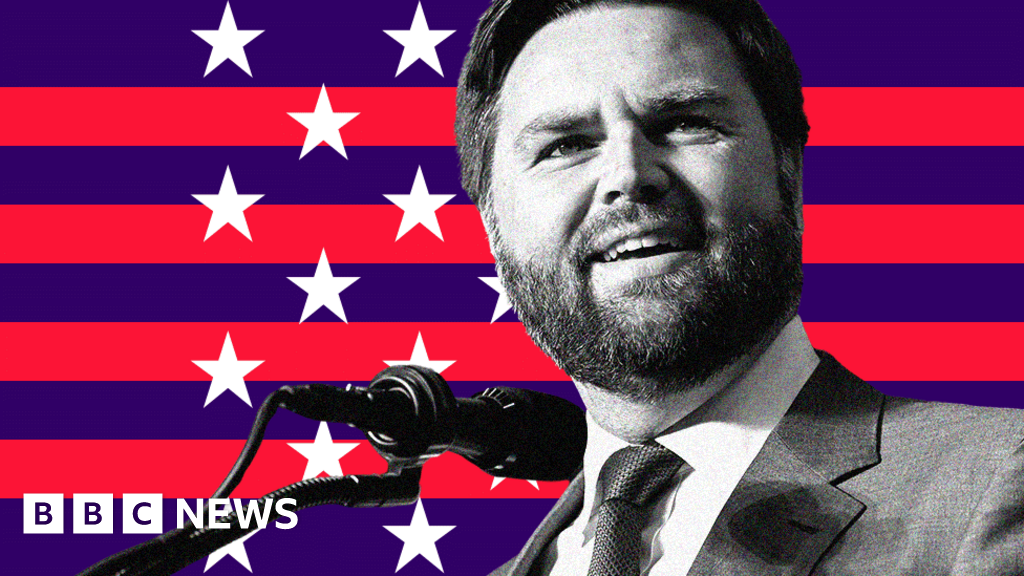Bussiness
Who is Trump’s vice president pick, JD Vance?

By Mike Wendling, BBC News
 Reuters
Reuters“I’m a ‘never Trump’ guy. I never liked him.”
“My god what an idiot.”
“I find him reprehensible.”
That was from JD Vance in interviews and on Twitter in 2016, when the publication of his memoir Hillbilly Elegy catapulted him to fame.
In the same year, he wrote privately on Facebook to Josh McLaurin, his former law school roommate, now a state Senator in Georgia: “I go back and forth between thinking Trump is a cynical asshole… or that he’s America’s Hitler”.
‘To go from those texts… to being Trump’s biggest cheerleader, it’s just kind of unbelievable,” Mr McLaurin, who is a member of the Democratic Party, told BBC Newshour.
A few short years later, Mr Vance transformed himself into one of Trump’s steadfast allies.
The first-term senator from Ohio is now by Trump’s side as vice-presidential running mate – and, by extension, an early frontrunner for the Republican presidential nomination in 2028 – with a reliably conservative voting record and Midwestern roots that Republicans hope will boost support at the ballot box.
In fact, Mr Vance has made something of a habit of transformation. How did he emerge from a tough upbringing to reach the highest levels of American politics?
Mr McLaurin told BBC Newshour that his former roommate previously felt like the Republican party needed to give working people hope as well as economic opportunities. If unsuccessful in doing so, Mr Vance believed a “demagogue” would fill that vacancy, he said.
According to Mr McLaurin, Mr Vance saw Trump as the demagogue.
When asked why Mr Vance has changed his stance on Trump, Mr McLaurin said he thinks it has to do with a “deep-seated anger”.
“There’s this joke that men would rather run for office than go to therapy and I think that’s probably especially true in his case,” he said.
 Reuters
ReutersMemoir makes him famous
Mr Vance was born James Donald Bowman in Middletown, Ohio, to a mother who struggled with addiction and a father who left the family when JD was a toddler.
He was raised by his grandparents, “Mamaw” and “Papaw”, whom he sympathetically portrayed in his 2016 memoir Hillbilly Elegy.
Mr Vance was adopted by his stepfather when he was six years old. He dropped his middle and last names – changing Donald, his biological father’s name, to David, which preserved his nickname of JD. His last name changed from Bowman to Hamel, his stepfather’s last name.
His mother split from his then-stepfather a few years later.
When he married after graduating law school, the couple took the last name of Vance to honour his maternal grandparents family name – leading to his current name: James David Vance.
Although Middletown is located in rust-belt Ohio, Mr Vance identified closely with his family’s roots slightly to the south in Appalachia, the vast mountainous inland region that stretches from the Deep South to the fringes of the industrial Midwest. It includes some of the country’s poorest areas.
Mr Vance painted an honest portrait of the trials, travails and bad decisions of his family members and friends. And his book also took a decidedly conservative view – describing them as chronic spendthrifts, dependent on welfare payments and mostly failing to pull themselves up by their bootstraps.
He wrote that he saw Appalachians “reacting to bad circumstances in the worst way possible” and that they were products of “a culture that encourages social decay instead of counteracting it”.
“The truth is hard,” he wrote, “and the hardest truths for hill people are the ones they must tell about themselves.”
While he poured scorn on “elites” and exclusive society, he painted himself as a counterpoint to the chronic failure of those he grew up with.
By the time the book came out, Mr Vance’s own bootstrap tugging had slung him far away from Middletown: first to the US Marines and a tour of duty in Iraq, and later to Ohio State University, Yale Law School and a job as a venture capitalist in California.
Hillbilly Elegy made him not only into a bestselling author, but a sought-after commentator who was frequently called upon to explain Donald Trump’s appeal to white, working-class voters.
He rarely missed an opportunity to criticise the then-Republican nominee.
“I think this election is really having a negative effect especially on the white working class,” he told an interviewer in October 2016.
“What it’s doing is giving people an excuse to point the finger at someone else, point the finger at Mexican immigrants, or Chinese trade or the Democratic elites or whatever else.”
From venture capital to politics
In 2017 Mr Vance returned to Ohio and continued to work in venture capital. He and his wife, Usha Chilukuri Vance, whom he met at Yale, have three children – Ewan, Vivek and Mirabel.
As the child of Indian immigrants who grew up in San Diego, Usha Vance has a very different background from her husband. She also attended Yale as an undergraduate and received a masters degree from University of Cambridge. She served as a clerk to Supreme Court Chief Justice John Roberts after law school and is currently a litigator.
Mr Vance’s name was long whispered about as a political candidate, and he saw an opportunity when Ohio’s Republican senator Rob Portman decided not to run for re-election in 2022.
Although his campaign was initially slow to get going, he got a kick-start via a $10m (£7.7m) donation by his former boss, Silicon Valley power broker Peter Thiel. But the real hurdle stopping him from getting elected in increasingly Republican Ohio was his past criticism of Trump.
He apologised for his previous remarks and managed to mend fences and earn Trump’s endorsement, pushing him to the top of the Republican field and eventually into the Senate.
In the process, Mr Vance has become an increasingly important player in the world of Make America Great Again politics – and has signed up almost completely to Trump’s agenda.
 Getty Images
Getty ImagesWhere does he stand on the issues?
In the Senate he has been a reliable conservative vote, backing populist economic policies and emerging as one of the biggest congressional sceptics of aid to Ukraine.
Given his short tenure in the Democrat-led chamber, the bills he has sponsored have rarely moved forward, and have more often been about sending messages than changing policy.
In recent months, Mr Vance introduced bills to withhold federal funds for colleges where there are encampments or protests against Israel’s war in Gaza, and to colleges that employ undocumented immigrants.
Mr Vance also sponsored legislation in March that would cut the Chinese government off from US capital markets if it does not follow international trade law.
He hit all of these themes at a recent speech at the National Conservatism Conference, where he declared: “The real threat to American democracy is that American voters keep on voting for less immigration and our politicians keep on rewarding us with more.”
He said the idea of the American Dream – “This very basic idea that you should be able to build a good life for yourself and your family in the country you call home” – was “under siege by the left”.
And he said that American involvement in Ukraine had “no obvious conclusion or even objective that we’re close to getting accomplished”.
Also at the conference, he said the UK was “not doing so good” because of immigration and claimed that under a Labour government, the country had become the “first truly Islamist country” with a nuclear bomb.
Mr Vance, who was baptised as a Catholic in 2019, has expressed support in the past for a nationwide abortion ban after 15 weeks. But he recently backed Trump’s view that the matter was for states to decide.
When his Hitler comment was first reported, in 2022, a spokesperson did not dispute it, but said it no longer represented his views.
How did Republicans – and others – react?
Mr Vance received waves of loud applause when he entered the convention arena in Milwaukee on Monday. He walked over to the Ohio contingent and, looking somewhat in awe of the scene, took selfies with delegates as he was being introduced.
“He’s from humble beginnings and he’s young,” said delegate Amanda Suffecool, the party’s chair in Portage County, in north-east Ohio. “A lot of people are going to think he looks like him.”
Mr Vance was also one of the first top Republicans to point the finger at Democrat campaign rhetoric in the wake of the attempted assassination of Donald Trump at a rally on Saturday.
“The central premise of the Biden campaign is that President Donald Trump is an authoritarian fascist who must be stopped at all costs,” he posted on X hours after the shooting. “That rhetoric led directly to President Trump’s attempted assassination.”
In comments on Monday, President Biden called Mr Vance a “clone of Trump” – indicating how Democrats will attempt to portray him for the rest of the campaign.











